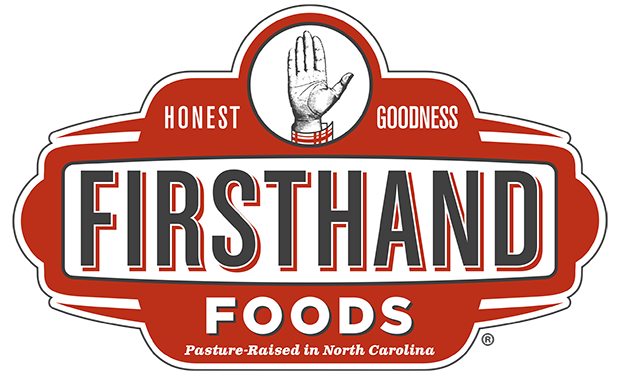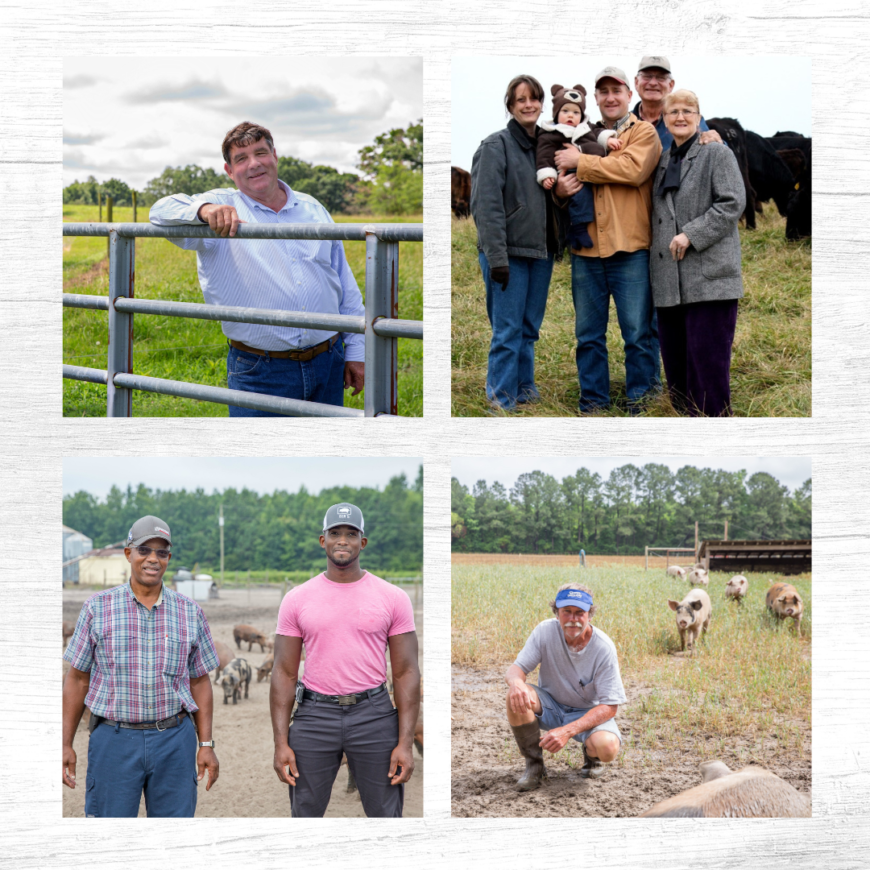Over 25 years ago, I moved here with my husband, eager to start a family, go back to school and explore a whole new part of the country. Since I’d always worked in food and agriculture, part of the draw to North Carolina was its abundance of small farms— a sharp contrast to the large-scale, corporate farming scene I’d become familiar with in California. Twelve years ago, we launched Firsthand Foods and I took on the job of developing our livestock producer network. I fell in love with North Carolina as I traveled its rural counties, walked with farmers through their pastures, and experienced the state’s beauty and history through their eyes. In this article, we share conversations with four of our farmers from across the state, each of whom reveals what they appreciate about their land and region.
The Piedmont Region
Eric Deal, Circle D Farm, China Grove, Rowan County
“What I love about farming in the Piedmont is the mixture of flatlands and foothills,” Eric says. “It offers a diversity of soil types—sandy loam and deep red clay— all of which are rewarding to manage once you get the hang of it. It’s also a great jumping off point to the mountains, which is our favorite place to vacation.”
The biggest challenge is the region’s tendency toward drought. Eric and his family are deeply committed to implementing pasture management practices that build soil, retain moisture, and improve forages. But it can feel like none of that matters when there is no rain for long periods of time. Eric is fond of saying, “A farmer’s attitude about life can change with the weather.”
Eric is the seventh generation to farm his family’s 400 acre cattle operation, an oasis of rolling pastures bordered by woodlands that are filled with oaks, maples, sweet gums, hickory, and loblolly pines. Circle D Farm is home to all sorts of wildlife, including hawks, deer, coyote, rabbits, groundhogs, and beavers. “One year we took our kids deep into the woods to harvest our own Christmas tree and we heard a Bobcat. I’ll never forget that sound…sort of like a goat but a lot wilder.”
Circle D Farm is just 30 miles north of Charlotte, a region no longer considered rural but more on the suburban fringe. For visitors to the area, Eric recommends Gary’s BBQ in China Grove. “It’s the one spot in this part of the state where you can get eastern style BBQ. I know it sounds sacrilegious since we’re surrounded on all sides by western style BBQ, but that’s what I grew up eating and appreciating.”
Eric is quick to mention that Rowan County (the town of Salisbury specifically) is the birthplace of Cheerwine. “When it’s hot out, nothing reminds me of home more than a cold can of Cheerwine and Cheese Nibs.”
Zizzy Osborne, Bar-O-Cattle Company, Eden, NC, Rockingham County
Zizzy grew up in Eden and has lived in North Carolina’s Piedmont region his whole life. “We’re fortunate to live in such a beautiful area and to be relatively protected from weather extremes. It’s never too hot or too cold. We’re also blessed to have plenty of water.”
Eden was once home to large textile mills and dye houses. Now companies like Miller Brewing and Purina have moved into the area to take advantage of the city’s abundant wastewater infrastructure. Farmland surrounds Eden. “Farmers used to raise tobacco here and you could make a decent living with just a few acres.That history means we’ve still got a lot of small farms. I appreciate that we’re free of the mega-farms that you find in other parts of the state.”
Bar-O-Cattle Company comprises 400 acres of rolling pasture and woodlands. The oaks and pines that dot the landscape provide critical shelter for his beef cattle and habitat for wildlife. Deer and raccoons are abundant but so are increasingly black bears and quail. “It’s pretty exciting to come upon a clutch of Quail eggs. They really seem to be making a comeback.”
Visitors to the area will appreciate canoeing, kayaking, or tubing down the Dan River, which makes its way through Rockingham County from the mountains. Hikers can easily get to Hanging Rock State Park for spectacular views of the Piedmont plateau.
The Coastal Plain
Jerel Hall, Chinquapin, Duplin County
Jerel Hall is a third generation African American farmer, a rare thing in a state in which only 3% of farmers are Black. Jerel and his father, Dwight, farm 40 acres near the town of Chinquapin, a town that derives its name from the Algonquin word for a diminutive cousin of the American Chestnut, a tree common along the area’s rivers and streams.
Jerel and his wife have three kids and he works full-time as a Technician at Guildford Lear, an automotive textile company. That means his time on the farm is limited to late afternoons. There you’ll find him tending to the hogs or managing their corn and soybean production, both raised exclusively for hog feed.
“Dad takes responsibility for the morning routines. And then as soon as I’m done with work, I hit the gym and head straight to the farm. I love working with the animals, watching them graze and wallow. It calms me down.”
The Hall’s farm in the coastal plain, an area known for sandy soils and hot, humid summers. How does Jerel deal with working outside in such hot weather? “I put a hat on, man up, and take the heat. I just surrender to it. Of course, I also appreciate an air conditioned space when I’m done.”
Wildlife—deer, coyote, wild turkeys, hawks, black bears—all make themselves seen or heard. “They don’t really cause any problems for us as long as we make noise throughout the day. We keep the radio playing to deter them.”
Jerel loves to bring his kids to the farm and his 12 year old son has become a real help. “It’s my hope they’ll learn to love this place and the animals we care for as much as I do.”
When they aren’t working or farming, Jerel and his family head to the beach. “I love Wrightsville Beach and the town of Wilmington. There is something there for everyone.”
David Whitman, Kenansville, Duplin County
David has lived his entire life on the flat sandy loam soils of North Carolina’s coastal plain. “I love it here because it is home. It’s all I’ve ever known and all I need to know.” David built his house on the road where he grew up. He prizes his short commute to work, which includes walking to the hog pens, pastures, and woodlands behind his house. “It’s a great region to farm. Rainfall is typically adequate for raising row crops and my hogs get to live outdoors all year round. I just have to make sure they have enough shade and water to wallow in during the summer.”
His favorite season is fall. “After months of sweltering heat and humidity, there is nothing like that first fall crisp morning.” His farm includes numerous trees, including various oaks, pine trees, and sweet gum. Squirrels, turkeys, deer and the occasional coyote are evident.
If you’re in the area, David suggests you visit Cliffs of the Neuse where you can stroll along high bluffs overlooking the Neuse, the longest river contained entirely within the state. Or, if you’re in the mood for a more social gathering, you can visit a local winery or check out Rose Hill’s namesake, “the largest frying pan in America.”

